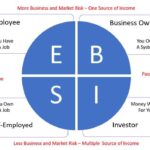Most of us have been conditioned to believe that earning money is directly tied to the hours we work. We clock in, put in our time, and receive a paycheck—a straightforward exchange of time for money. This traditional “work-for-a-wage” mindset is deeply ingrained in our society, often leading us to equate hard work with financial success. However, this perspective can be limiting, especially when it comes to achieving true financial freedom.
Related Post: 8 Simple Ways Entrepreneurs Think Differently Than Most People
Entrepreneurs, on the other hand, view money through a different lens. They understand that income is not solely the result of labor but is more significantly influenced by the ability to identify problems and create valuable solutions. This shift from viewing money as a direct compensation for time to seeing it as a reward for innovation and problem-solving is a fundamental difference between traditional employees and entrepreneurs.
The Limitations of Trading Time for Money
Relying solely on a paycheck from an employer places a cap on your earning potential. No matter how many hours you work, there’s a finite limit to how much you can earn because time is a limited resource. Additionally, this approach often lacks job security, as companies may downsize or restructure, leaving employees vulnerable to layoffs. The traditional employment model also means that your financial well-being is largely in the hands of your employer, which can be a precarious position in today’s rapidly changing economy.
Related Post: 6 Reasons Why You Need to Have a Side Hustle and Income Security: Why Being an Employee is Just too Risky
Embracing Creative Thinking for Financial Growth
Entrepreneurs recognize that by shifting their focus from working harder to working smarter, they can unlock greater financial potential. This involves leveraging creativity to develop products or services that address unmet needs or improve upon existing solutions. By doing so, they create value that customers are willing to pay for, independent of the time invested. This approach not only enhances earning potential but also offers greater flexibility and control over one’s financial destiny.
Developing an Entrepreneurial Mindset
Transitioning from a wage-based mindset to an entrepreneurial one requires a change in how we perceive work and income. It involves embracing risk, being open to failure as a learning opportunity, and continually seeking innovative ways to solve problems. Entrepreneurs often invest time and resources upfront without immediate returns, but the long-term benefits can far outweigh the initial sacrifices. This mindset encourages continuous learning, adaptability, and resilience—key traits for navigating the uncertainties of entrepreneurship.
Practical Steps to Shift Your Financial Paradigm
- Identify Your Passions and Skills: Consider what you enjoy doing and where your strengths lie. This self-awareness can help you identify opportunities where you can add unique value.
- Spot Problems and Needs: Pay attention to challenges people face in everyday life or within specific industries. These pain points are potential opportunities for innovative solutions.
- Develop a Solution: Use your creativity to design a product or service that effectively and efficiently addresses the identified problem.
- Test Your Idea: Before fully committing, seek feedback from potential customers to validate your concept and make necessary adjustments.
- Start Small: Consider launching your venture as a side hustle to mitigate risk while you gain experience and build a customer base.
- Embrace Continuous Learning: Stay informed about industry trends, seek mentorship, and be willing to adapt your strategies as you learn and grow.
Conclusion
Shifting from a traditional wage-based approach to one centered on creative problem-solving can open doors to greater financial freedom and personal fulfillment. By focusing on creating value through innovative solutions, you can move beyond the limitations of trading time for money and embark on a more rewarding financial journey.
So, what do you think about money? Are you still stuck trading time for dollars, or are you ready to start getting paid for your ideas?












